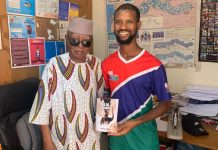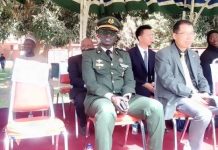Art and Culture
withMamour M. Mbenga
Consultative Meeting on Safeguarding Intangible Cultural Heritage Held
The National Centre for Arts and Culture (NCAC), in collaboration with the UNESCO Regional Office in Dakar, held  a two day consultative meeting on the needs assessment for safeguarding the Intangible Cultural Heritage (ICH). The meeting which took place from the 16 – 17 June, 2015 was held at the Gambia Tourism and Hospitality institute (G.T.H.I) in Kanifing.
Delivering a statement on cultural issues, the Minister for Tourism and Culture Benjamin Roberts said “Culture is an identifying uniform, behavior, attitude, style and pattern of people that always practices what they were born with as a record living history. The primary objective of this forum is to identify the needs assessment of our daily practice on cultural issues within our society and for safeguarding our intangible cultural heritage (I.C.H) in the Gambia.”
Minister Roberts also stressed the need for family elders, village chiefs, institutions and the younger generation to engage in research and to practice and perform their cultural heritage into a cultural diversity as great Africans.
NATCOM Secretary General, MomodouSannehsaid the main goal of this meeting is to safeguard cultural practices and renew their cultural styles and living habit towards the electronic society of today.
Mr. Sanneh also urged the people to find out their ethnic cultural diversity and be able to practice it.
The Permanent Secretary of Tourism and Culture, Mr.ModouJoof, for his part, said “The Gambian cultures are almost fading away, the young children of today engage more into sport games, cartoons, movies etc.”
P.S ModouJoof told parents, schools and family to work as people with cultural values in developing nature.
Mr. Baba Ceesay, Director General of the National Centre for Arts and Culture (NCAC), defines intangible cultural heritage (I.C.H) within the legal and institutional frame work as the practices, representations, expressions, knowledge skills, as well as the instruments, objects, art effects and cultural spaces with associates with the communities, groups and individual.
According to him, intangible cultural heritage transmitted from generation to generation, is constantly recreated by communities and groups in response to their environment. Mr. Ceesay added that this interaction with nature and their history provides them with a sense of identity and continuity, promoting respect for cultural diversity and human creativity, Intangible cultural heritage with the practice of international human rights instruments, as well as with the requirements of mutual respect among communities, groups and individuals, and of sustainable development.
The NCAC Director General emphasized the need for safeguarding the measures aimed at ensuring the viability of the intangible cultural heritage, including the identification, documentation research preservation amongst others, particularly through formal and non-formal education, as well as the revitalization of the various aspects of such heritage.
A UNESCO Consultant, Baba Keita, who also did a report on Regional Consultations, said “the two main obligations of state parties under the UNESCO convention 2003 are; to take necessary measures to safeguard the ICH present in their territory with full involvement of communities and to update these inventories regularly and building capacity for safeguarding among all stakeholders, including communities, creating awareness and promotion activities, education, policy and legislation”.
The UNESCO Consultant, who is also the representative from the UNESCO Regional Office in Dakar, recommends the encouragement of cooperation and networking between communities, experts, research centres, Universities and international networks, to organize ICH forums for youths and children on issues of language, food, dress, etc, at the level of schools and communities. He added that this can as well promote existing traditional management and transmission systems, including the concept of traditional communicators, chiefs village heads and recognize cultural ambassadors at national and regional levels. This, he said, is to support genealogy projects at history level, to promote cultural identity through dress codes, culinary culture (food), leading by example (national Assembly, T.V presenters, law makers bankers, diplomatic missions etc.
As part of the two days meeting, participants were divided into groups to work collectively and share group work on needs assessment for ICH and to find answers to the questions why the country is losing its intangible cultural heritage and what can be done to safeguard it.]]>
a two day consultative meeting on the needs assessment for safeguarding the Intangible Cultural Heritage (ICH). The meeting which took place from the 16 – 17 June, 2015 was held at the Gambia Tourism and Hospitality institute (G.T.H.I) in Kanifing.
Delivering a statement on cultural issues, the Minister for Tourism and Culture Benjamin Roberts said “Culture is an identifying uniform, behavior, attitude, style and pattern of people that always practices what they were born with as a record living history. The primary objective of this forum is to identify the needs assessment of our daily practice on cultural issues within our society and for safeguarding our intangible cultural heritage (I.C.H) in the Gambia.”
Minister Roberts also stressed the need for family elders, village chiefs, institutions and the younger generation to engage in research and to practice and perform their cultural heritage into a cultural diversity as great Africans.
NATCOM Secretary General, MomodouSannehsaid the main goal of this meeting is to safeguard cultural practices and renew their cultural styles and living habit towards the electronic society of today.
Mr. Sanneh also urged the people to find out their ethnic cultural diversity and be able to practice it.
The Permanent Secretary of Tourism and Culture, Mr.ModouJoof, for his part, said “The Gambian cultures are almost fading away, the young children of today engage more into sport games, cartoons, movies etc.”
P.S ModouJoof told parents, schools and family to work as people with cultural values in developing nature.
Mr. Baba Ceesay, Director General of the National Centre for Arts and Culture (NCAC), defines intangible cultural heritage (I.C.H) within the legal and institutional frame work as the practices, representations, expressions, knowledge skills, as well as the instruments, objects, art effects and cultural spaces with associates with the communities, groups and individual.
According to him, intangible cultural heritage transmitted from generation to generation, is constantly recreated by communities and groups in response to their environment. Mr. Ceesay added that this interaction with nature and their history provides them with a sense of identity and continuity, promoting respect for cultural diversity and human creativity, Intangible cultural heritage with the practice of international human rights instruments, as well as with the requirements of mutual respect among communities, groups and individuals, and of sustainable development.
The NCAC Director General emphasized the need for safeguarding the measures aimed at ensuring the viability of the intangible cultural heritage, including the identification, documentation research preservation amongst others, particularly through formal and non-formal education, as well as the revitalization of the various aspects of such heritage.
A UNESCO Consultant, Baba Keita, who also did a report on Regional Consultations, said “the two main obligations of state parties under the UNESCO convention 2003 are; to take necessary measures to safeguard the ICH present in their territory with full involvement of communities and to update these inventories regularly and building capacity for safeguarding among all stakeholders, including communities, creating awareness and promotion activities, education, policy and legislation”.
The UNESCO Consultant, who is also the representative from the UNESCO Regional Office in Dakar, recommends the encouragement of cooperation and networking between communities, experts, research centres, Universities and international networks, to organize ICH forums for youths and children on issues of language, food, dress, etc, at the level of schools and communities. He added that this can as well promote existing traditional management and transmission systems, including the concept of traditional communicators, chiefs village heads and recognize cultural ambassadors at national and regional levels. This, he said, is to support genealogy projects at history level, to promote cultural identity through dress codes, culinary culture (food), leading by example (national Assembly, T.V presenters, law makers bankers, diplomatic missions etc.
As part of the two days meeting, participants were divided into groups to work collectively and share group work on needs assessment for ICH and to find answers to the questions why the country is losing its intangible cultural heritage and what can be done to safeguard it.]]>


















